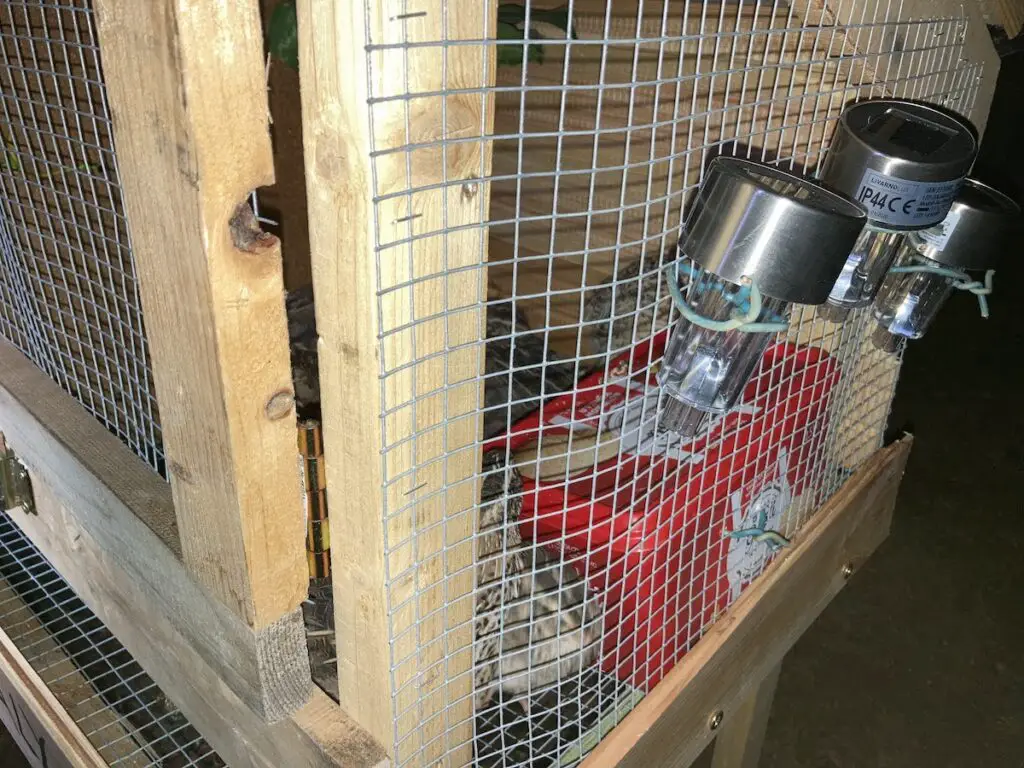When you start keeping quail to have fresh eggs daily, it is so exciting to go to the cage and see if there are any eggs. It can become quite addictive. I still visit my cage several times a day, and I get such a thrill out of every single egg I find. But what if you don’t find any eggs or much fewer than you expected?
The main reasons why quail don’t lay eggs are the bird’s age, lack of light, a lack of a balanced diet, or the presence of a source of stress. In optimal conditions, your quail should lay eggs year-round, and they keep up their egg production even in the winter months.
Don’t worry, most of the time, the lack of egg production isn’t permanent, and there are a few things you can do to fix the issue.
Quail age
Quail start laying eggs at around 6-7 weeks, which is very early compared to chickens and other birds. This time can vary, and egg production doesn’t reach its peak until they reach about 10-12 weeks of age.
Learn how to raise your own quail and have an unlimited supply of eggs and meat.
It’s important to note, in case you don’t know this already, that only quail hens lay eggs. If you have roosters in the covey, they will never lay eggs. They are free-loaders raised for their meat and are not worth keeping longer than 8-10 weeks. They are culled at this point. You may want to keep one or two of them to breed the hens, but don’t expect eggs from them. A covey of 10 hens and 3 roosters can only produce a maximum of 10 eggs per day.
OK, so having clarified the question about the roosters, what if your hens aren’t laying?
My initial flock of 19 hens produced the first egg exactly 6 weeks after hatching. It was a single egg. I had nothing the following day, and two eggs the day after that.

At week 8, I was getting 10 eggs a day, and at week 10, they gave me 15 eggs a day. Only at week 12 did I get 18-19 eggs per day, which is considered their peak production.
If your quail are less than 8 weeks old and they haven’t started laying, don’t worry. Give them a little more time.
If your quail are less than 12 weeks old, and they don’t lay an egg a day consistently, again, you don’t need to worry because they ramp up their egg production gradually.
Another reason why your quail may not lay is old age. After they reach 1.5 years of age, their egg production decreases dramatically. Remember that they are getting close to the end of their lifespan.
If you bought your birds from someone you don’t know or trust, you may have gotten old birds. It’s always best to source your birds from a reliable source.
Lack of light
If your birds are between 12 weeks and 1.5 years old, and they still don’t produce eggs, they may get too few hours of light. To keep producing eggs, your quail need approximately 14 hours of light. This can be a combination of natural and artificial light.
The light doesn’t need to be very bright but sufficient for the birds to see. Quail are diurnal birds, which means that they are active during the day and they rest at night. You can regulate their biorhythm by providing sufficient light. I use a small, 10 watt LED floodlight in the winter, and it does the job.
On the other hand, I also made a quail cage and gave 10 quail to my mother-in-law. She wanted to keep it outdoors, and I attached some small solar lights to extend the bright hours. Unfortunately, the lights were insufficient for the birds to lay, and as long as the days were short in the winter, she only got 1-2 eggs per day. As soon as there was a stretch in the day, egg production also increased.

Diet
It takes a lot of energy, and it requires a lot of raw material to lay an egg a day. Quail are small birds, and their eggs are relatively large (about 5% of their body weight).
To keep up with egg production, they need to have sufficient proteins, minerals, and a lot of calcium. Calcium is important because it provides the raw material for the eggshell. If the food lacks calcium, you may have some eggs with a soft shell like this one.
If you raise your quail from when they hatched or from a young age, you should feed them with a starter feed at the beginning. The components of this type of feed are optimized to make them reach a healthy size and weight as fast as possible. They contain a high level of protein, but very little calcium, as it’s not essential at this point yet.
Some people transition from the starter feed to a grow-out feed after 2-3 weeks and keep the quail on this diet until weeks 5-6.
The latest, when the quail reach 6 weeks of age, or as soon as they start producing eggs, you should change the feed to a layer feed, which contains a minimum of 2% of calcium and less protein than the starter and the grow-out feeds.
In this article I go in depth about feeding your quail, including a full break-down of costs associated.
Stress
Stress can also cause your quail to stop laying eggs for a while. This can come in various forms.
The presence of a predator
If your quail are visited and frightened regularly by a predator, such as a fox, a rat, or a weasel, they perceive it as a source of stress. If you have a dog that keeps on barking at them or tries to grab them, they also perceive it as a predator, even though you don’t.
If you suspect a predator may be harassing your quail, try to take extra measures to make them feel safe. If you keep them outdoors, fence off the cage area or keep the cage high enough so they can’t be reached. You can also provide your quail with a hiding place where they can retreat.
Change of location
If you move your birds from one cage to a different one, or you move them to a new location altogether, they perceive it as stress.
I bought adult birds that were already laying consistently at their previous owner, and their production decreased dramatically for a few days when I put them in their new cage. After a week, they felt at home, the stress had gone, and everything was back to normal.
I also noticed a drop in egg production with a covey of 10 quail hens when I moved in three roosters as new mates. Some hens didn’t appreciate the newcomers and got aggressive with them. The roosters also acted aggressively initially (I wrote an entire article about quail aggression and how to deal with it here).

